Case study Mental Health Assessment
VerifiedAdded on 2021/02/19
|6
|2082
|416
AI Summary
Contribute Materials
Your contribution can guide someone’s learning journey. Share your
documents today.
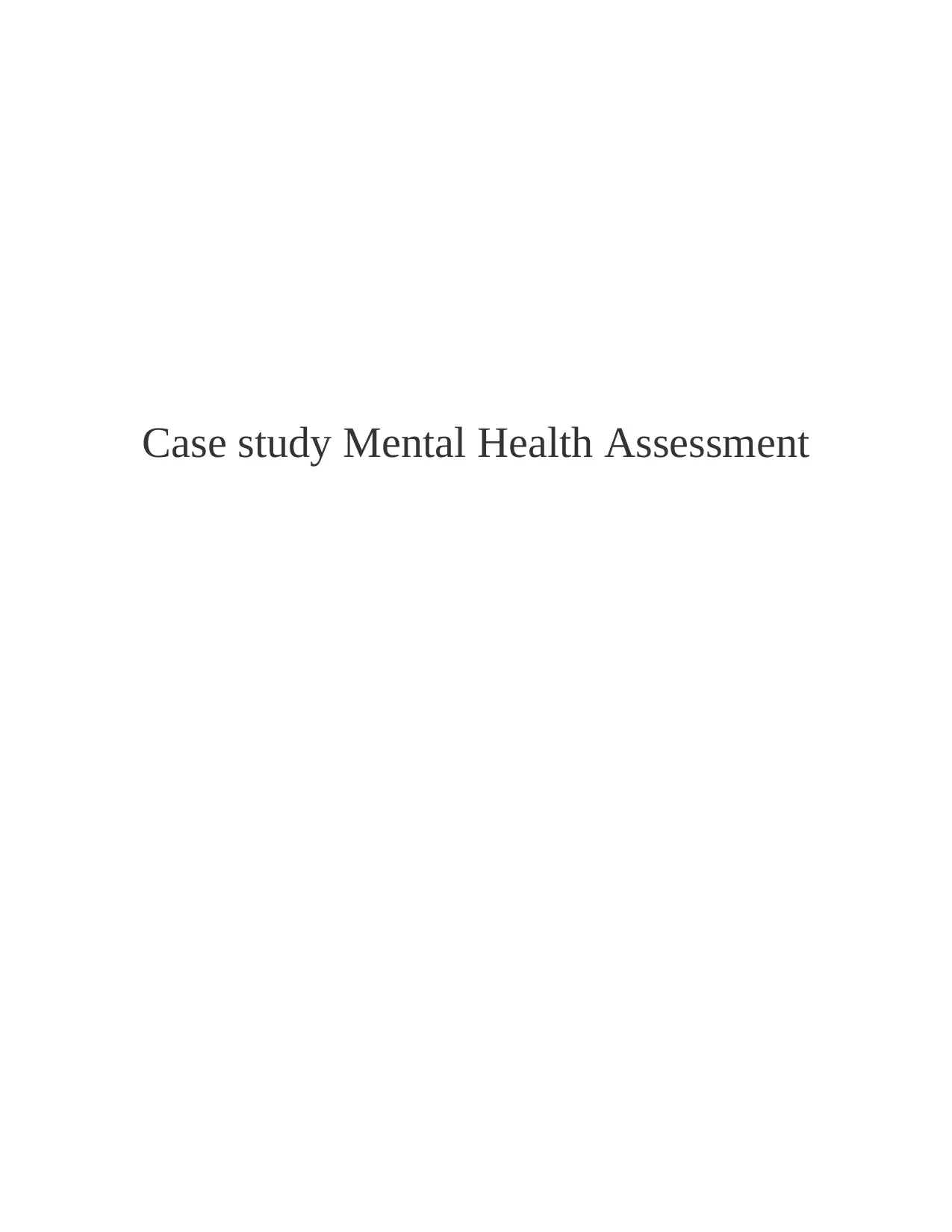
Case study Mental Health Assessment
Secure Best Marks with AI Grader
Need help grading? Try our AI Grader for instant feedback on your assignments.
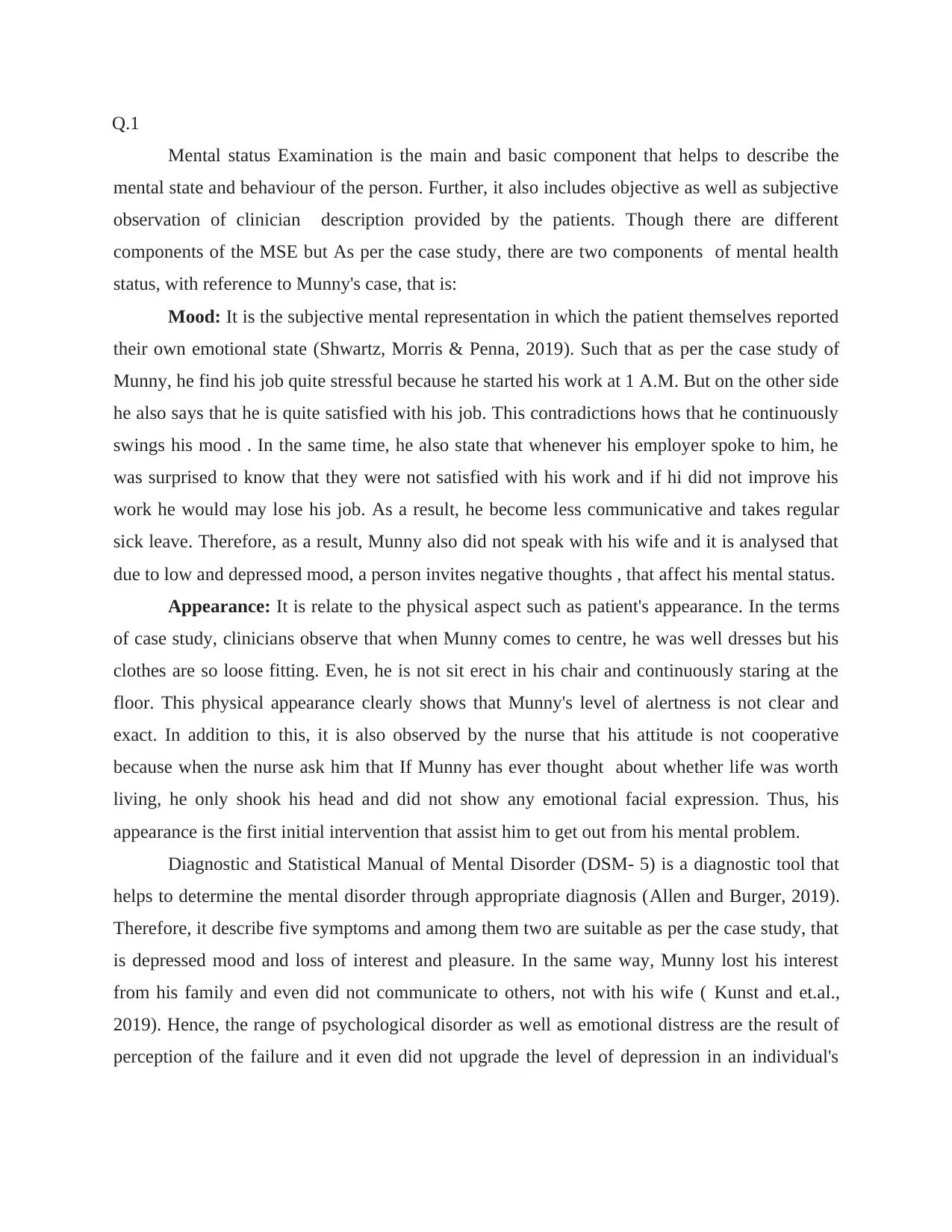
Q.1
Mental status Examination is the main and basic component that helps to describe the
mental state and behaviour of the person. Further, it also includes objective as well as subjective
observation of clinician description provided by the patients. Though there are different
components of the MSE but As per the case study, there are two components of mental health
status, with reference to Munny's case, that is:
Mood: It is the subjective mental representation in which the patient themselves reported
their own emotional state (Shwartz, Morris & Penna, 2019). Such that as per the case study of
Munny, he find his job quite stressful because he started his work at 1 A.M. But on the other side
he also says that he is quite satisfied with his job. This contradictions hows that he continuously
swings his mood . In the same time, he also state that whenever his employer spoke to him, he
was surprised to know that they were not satisfied with his work and if hi did not improve his
work he would may lose his job. As a result, he become less communicative and takes regular
sick leave. Therefore, as a result, Munny also did not speak with his wife and it is analysed that
due to low and depressed mood, a person invites negative thoughts , that affect his mental status.
Appearance: It is relate to the physical aspect such as patient's appearance. In the terms
of case study, clinicians observe that when Munny comes to centre, he was well dresses but his
clothes are so loose fitting. Even, he is not sit erect in his chair and continuously staring at the
floor. This physical appearance clearly shows that Munny's level of alertness is not clear and
exact. In addition to this, it is also observed by the nurse that his attitude is not cooperative
because when the nurse ask him that If Munny has ever thought about whether life was worth
living, he only shook his head and did not show any emotional facial expression. Thus, his
appearance is the first initial intervention that assist him to get out from his mental problem.
Diagnostic and Statistical Manual of Mental Disorder (DSM- 5) is a diagnostic tool that
helps to determine the mental disorder through appropriate diagnosis (Allen and Burger, 2019).
Therefore, it describe five symptoms and among them two are suitable as per the case study, that
is depressed mood and loss of interest and pleasure. In the same way, Munny lost his interest
from his family and even did not communicate to others, not with his wife ( Kunst and et.al.,
2019). Hence, the range of psychological disorder as well as emotional distress are the result of
perception of the failure and it even did not upgrade the level of depression in an individual's
Mental status Examination is the main and basic component that helps to describe the
mental state and behaviour of the person. Further, it also includes objective as well as subjective
observation of clinician description provided by the patients. Though there are different
components of the MSE but As per the case study, there are two components of mental health
status, with reference to Munny's case, that is:
Mood: It is the subjective mental representation in which the patient themselves reported
their own emotional state (Shwartz, Morris & Penna, 2019). Such that as per the case study of
Munny, he find his job quite stressful because he started his work at 1 A.M. But on the other side
he also says that he is quite satisfied with his job. This contradictions hows that he continuously
swings his mood . In the same time, he also state that whenever his employer spoke to him, he
was surprised to know that they were not satisfied with his work and if hi did not improve his
work he would may lose his job. As a result, he become less communicative and takes regular
sick leave. Therefore, as a result, Munny also did not speak with his wife and it is analysed that
due to low and depressed mood, a person invites negative thoughts , that affect his mental status.
Appearance: It is relate to the physical aspect such as patient's appearance. In the terms
of case study, clinicians observe that when Munny comes to centre, he was well dresses but his
clothes are so loose fitting. Even, he is not sit erect in his chair and continuously staring at the
floor. This physical appearance clearly shows that Munny's level of alertness is not clear and
exact. In addition to this, it is also observed by the nurse that his attitude is not cooperative
because when the nurse ask him that If Munny has ever thought about whether life was worth
living, he only shook his head and did not show any emotional facial expression. Thus, his
appearance is the first initial intervention that assist him to get out from his mental problem.
Diagnostic and Statistical Manual of Mental Disorder (DSM- 5) is a diagnostic tool that
helps to determine the mental disorder through appropriate diagnosis (Allen and Burger, 2019).
Therefore, it describe five symptoms and among them two are suitable as per the case study, that
is depressed mood and loss of interest and pleasure. In the same way, Munny lost his interest
from his family and even did not communicate to others, not with his wife ( Kunst and et.al.,
2019). Hence, the range of psychological disorder as well as emotional distress are the result of
perception of the failure and it even did not upgrade the level of depression in an individual's
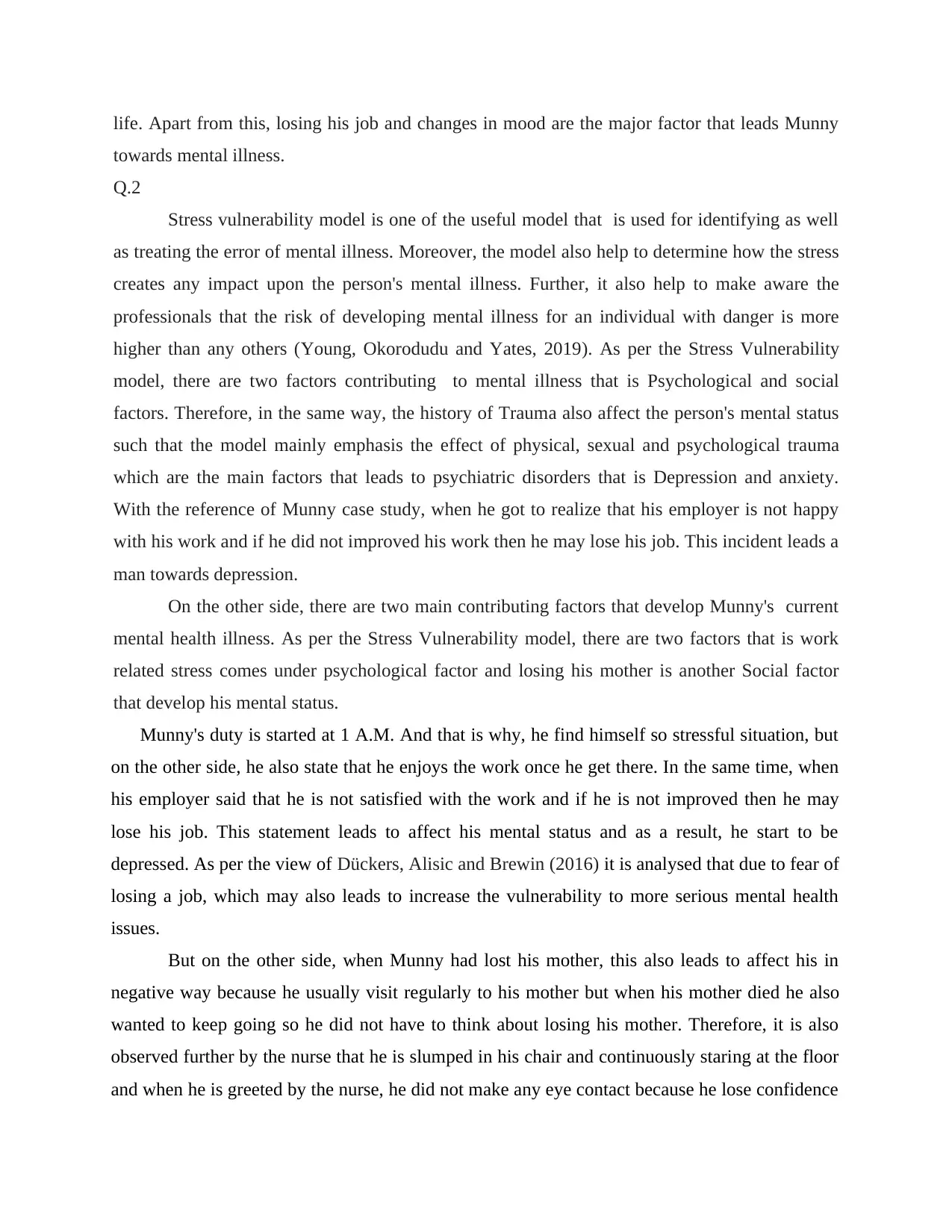
life. Apart from this, losing his job and changes in mood are the major factor that leads Munny
towards mental illness.
Q.2
Stress vulnerability model is one of the useful model that is used for identifying as well
as treating the error of mental illness. Moreover, the model also help to determine how the stress
creates any impact upon the person's mental illness. Further, it also help to make aware the
professionals that the risk of developing mental illness for an individual with danger is more
higher than any others (Young, Okorodudu and Yates, 2019). As per the Stress Vulnerability
model, there are two factors contributing to mental illness that is Psychological and social
factors. Therefore, in the same way, the history of Trauma also affect the person's mental status
such that the model mainly emphasis the effect of physical, sexual and psychological trauma
which are the main factors that leads to psychiatric disorders that is Depression and anxiety.
With the reference of Munny case study, when he got to realize that his employer is not happy
with his work and if he did not improved his work then he may lose his job. This incident leads a
man towards depression.
On the other side, there are two main contributing factors that develop Munny's current
mental health illness. As per the Stress Vulnerability model, there are two factors that is work
related stress comes under psychological factor and losing his mother is another Social factor
that develop his mental status.
Munny's duty is started at 1 A.M. And that is why, he find himself so stressful situation, but
on the other side, he also state that he enjoys the work once he get there. In the same time, when
his employer said that he is not satisfied with the work and if he is not improved then he may
lose his job. This statement leads to affect his mental status and as a result, he start to be
depressed. As per the view of Dückers, Alisic and Brewin (2016) it is analysed that due to fear of
losing a job, which may also leads to increase the vulnerability to more serious mental health
issues.
But on the other side, when Munny had lost his mother, this also leads to affect his in
negative way because he usually visit regularly to his mother but when his mother died he also
wanted to keep going so he did not have to think about losing his mother. Therefore, it is also
observed further by the nurse that he is slumped in his chair and continuously staring at the floor
and when he is greeted by the nurse, he did not make any eye contact because he lose confidence
towards mental illness.
Q.2
Stress vulnerability model is one of the useful model that is used for identifying as well
as treating the error of mental illness. Moreover, the model also help to determine how the stress
creates any impact upon the person's mental illness. Further, it also help to make aware the
professionals that the risk of developing mental illness for an individual with danger is more
higher than any others (Young, Okorodudu and Yates, 2019). As per the Stress Vulnerability
model, there are two factors contributing to mental illness that is Psychological and social
factors. Therefore, in the same way, the history of Trauma also affect the person's mental status
such that the model mainly emphasis the effect of physical, sexual and psychological trauma
which are the main factors that leads to psychiatric disorders that is Depression and anxiety.
With the reference of Munny case study, when he got to realize that his employer is not happy
with his work and if he did not improved his work then he may lose his job. This incident leads a
man towards depression.
On the other side, there are two main contributing factors that develop Munny's current
mental health illness. As per the Stress Vulnerability model, there are two factors that is work
related stress comes under psychological factor and losing his mother is another Social factor
that develop his mental status.
Munny's duty is started at 1 A.M. And that is why, he find himself so stressful situation, but
on the other side, he also state that he enjoys the work once he get there. In the same time, when
his employer said that he is not satisfied with the work and if he is not improved then he may
lose his job. This statement leads to affect his mental status and as a result, he start to be
depressed. As per the view of Dückers, Alisic and Brewin (2016) it is analysed that due to fear of
losing a job, which may also leads to increase the vulnerability to more serious mental health
issues.
But on the other side, when Munny had lost his mother, this also leads to affect his in
negative way because he usually visit regularly to his mother but when his mother died he also
wanted to keep going so he did not have to think about losing his mother. Therefore, it is also
observed further by the nurse that he is slumped in his chair and continuously staring at the floor
and when he is greeted by the nurse, he did not make any eye contact because he lose confidence
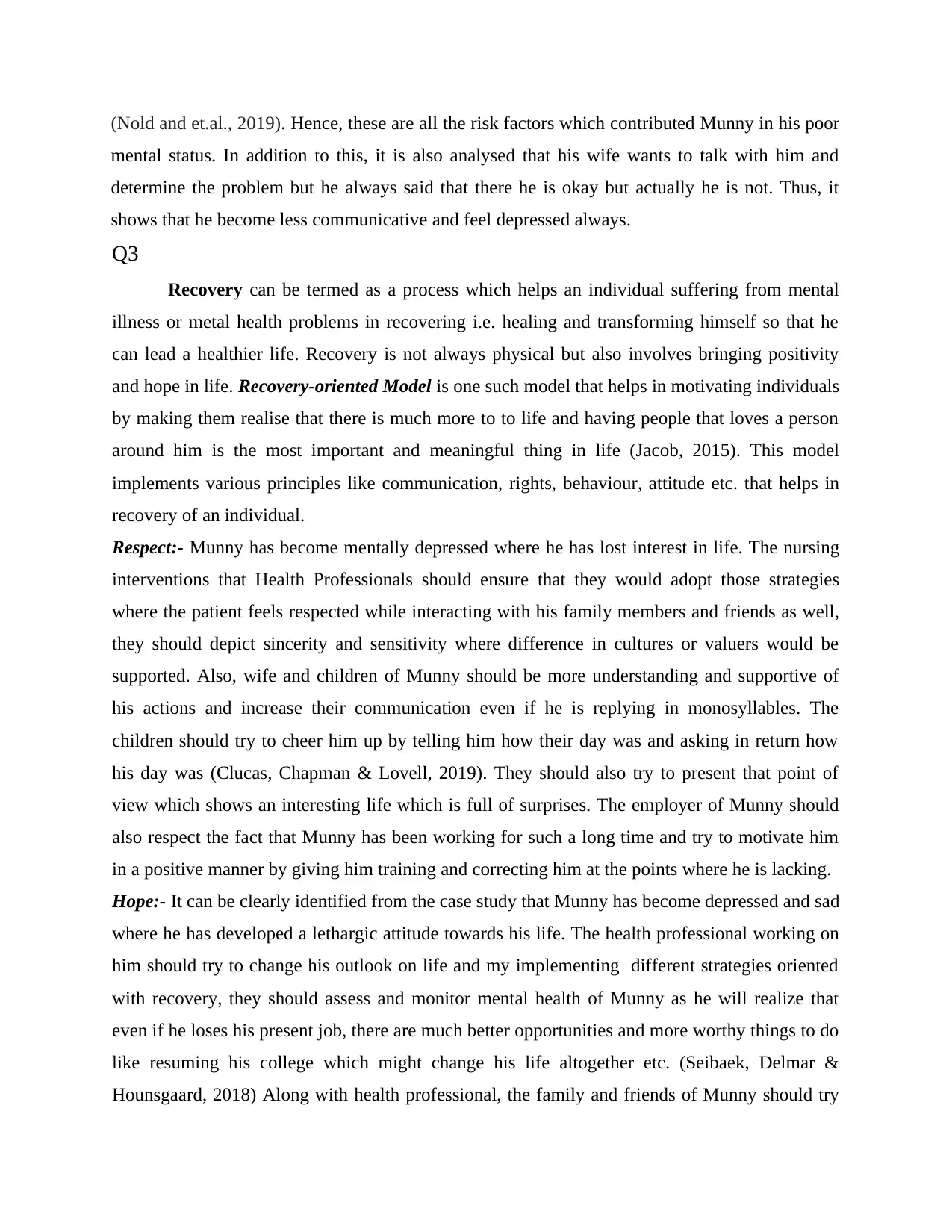
(Nold and et.al., 2019). Hence, these are all the risk factors which contributed Munny in his poor
mental status. In addition to this, it is also analysed that his wife wants to talk with him and
determine the problem but he always said that there he is okay but actually he is not. Thus, it
shows that he become less communicative and feel depressed always.
Q3
Recovery can be termed as a process which helps an individual suffering from mental
illness or metal health problems in recovering i.e. healing and transforming himself so that he
can lead a healthier life. Recovery is not always physical but also involves bringing positivity
and hope in life. Recovery-oriented Model is one such model that helps in motivating individuals
by making them realise that there is much more to to life and having people that loves a person
around him is the most important and meaningful thing in life (Jacob, 2015). This model
implements various principles like communication, rights, behaviour, attitude etc. that helps in
recovery of an individual.
Respect:- Munny has become mentally depressed where he has lost interest in life. The nursing
interventions that Health Professionals should ensure that they would adopt those strategies
where the patient feels respected while interacting with his family members and friends as well,
they should depict sincerity and sensitivity where difference in cultures or valuers would be
supported. Also, wife and children of Munny should be more understanding and supportive of
his actions and increase their communication even if he is replying in monosyllables. The
children should try to cheer him up by telling him how their day was and asking in return how
his day was (Clucas, Chapman & Lovell, 2019). They should also try to present that point of
view which shows an interesting life which is full of surprises. The employer of Munny should
also respect the fact that Munny has been working for such a long time and try to motivate him
in a positive manner by giving him training and correcting him at the points where he is lacking.
Hope:- It can be clearly identified from the case study that Munny has become depressed and sad
where he has developed a lethargic attitude towards his life. The health professional working on
him should try to change his outlook on life and my implementing different strategies oriented
with recovery, they should assess and monitor mental health of Munny as he will realize that
even if he loses his present job, there are much better opportunities and more worthy things to do
like resuming his college which might change his life altogether etc. (Seibaek, Delmar &
Hounsgaard, 2018) Along with health professional, the family and friends of Munny should try
mental status. In addition to this, it is also analysed that his wife wants to talk with him and
determine the problem but he always said that there he is okay but actually he is not. Thus, it
shows that he become less communicative and feel depressed always.
Q3
Recovery can be termed as a process which helps an individual suffering from mental
illness or metal health problems in recovering i.e. healing and transforming himself so that he
can lead a healthier life. Recovery is not always physical but also involves bringing positivity
and hope in life. Recovery-oriented Model is one such model that helps in motivating individuals
by making them realise that there is much more to to life and having people that loves a person
around him is the most important and meaningful thing in life (Jacob, 2015). This model
implements various principles like communication, rights, behaviour, attitude etc. that helps in
recovery of an individual.
Respect:- Munny has become mentally depressed where he has lost interest in life. The nursing
interventions that Health Professionals should ensure that they would adopt those strategies
where the patient feels respected while interacting with his family members and friends as well,
they should depict sincerity and sensitivity where difference in cultures or valuers would be
supported. Also, wife and children of Munny should be more understanding and supportive of
his actions and increase their communication even if he is replying in monosyllables. The
children should try to cheer him up by telling him how their day was and asking in return how
his day was (Clucas, Chapman & Lovell, 2019). They should also try to present that point of
view which shows an interesting life which is full of surprises. The employer of Munny should
also respect the fact that Munny has been working for such a long time and try to motivate him
in a positive manner by giving him training and correcting him at the points where he is lacking.
Hope:- It can be clearly identified from the case study that Munny has become depressed and sad
where he has developed a lethargic attitude towards his life. The health professional working on
him should try to change his outlook on life and my implementing different strategies oriented
with recovery, they should assess and monitor mental health of Munny as he will realize that
even if he loses his present job, there are much better opportunities and more worthy things to do
like resuming his college which might change his life altogether etc. (Seibaek, Delmar &
Hounsgaard, 2018) Along with health professional, the family and friends of Munny should try
Secure Best Marks with AI Grader
Need help grading? Try our AI Grader for instant feedback on your assignments.
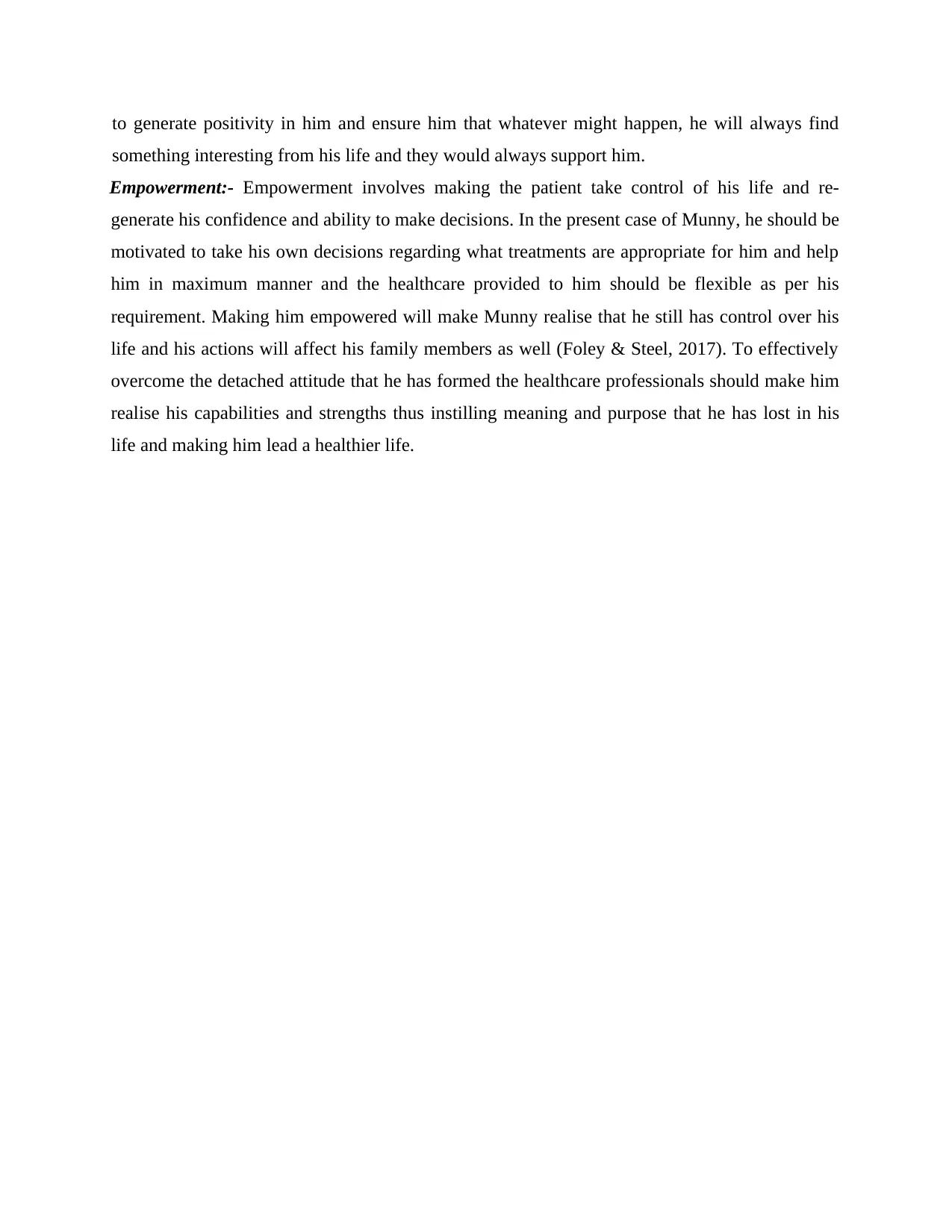
to generate positivity in him and ensure him that whatever might happen, he will always find
something interesting from his life and they would always support him.
Empowerment:- Empowerment involves making the patient take control of his life and re-
generate his confidence and ability to make decisions. In the present case of Munny, he should be
motivated to take his own decisions regarding what treatments are appropriate for him and help
him in maximum manner and the healthcare provided to him should be flexible as per his
requirement. Making him empowered will make Munny realise that he still has control over his
life and his actions will affect his family members as well (Foley & Steel, 2017). To effectively
overcome the detached attitude that he has formed the healthcare professionals should make him
realise his capabilities and strengths thus instilling meaning and purpose that he has lost in his
life and making him lead a healthier life.
something interesting from his life and they would always support him.
Empowerment:- Empowerment involves making the patient take control of his life and re-
generate his confidence and ability to make decisions. In the present case of Munny, he should be
motivated to take his own decisions regarding what treatments are appropriate for him and help
him in maximum manner and the healthcare provided to him should be flexible as per his
requirement. Making him empowered will make Munny realise that he still has control over his
life and his actions will affect his family members as well (Foley & Steel, 2017). To effectively
overcome the detached attitude that he has formed the healthcare professionals should make him
realise his capabilities and strengths thus instilling meaning and purpose that he has lost in his
life and making him lead a healthier life.
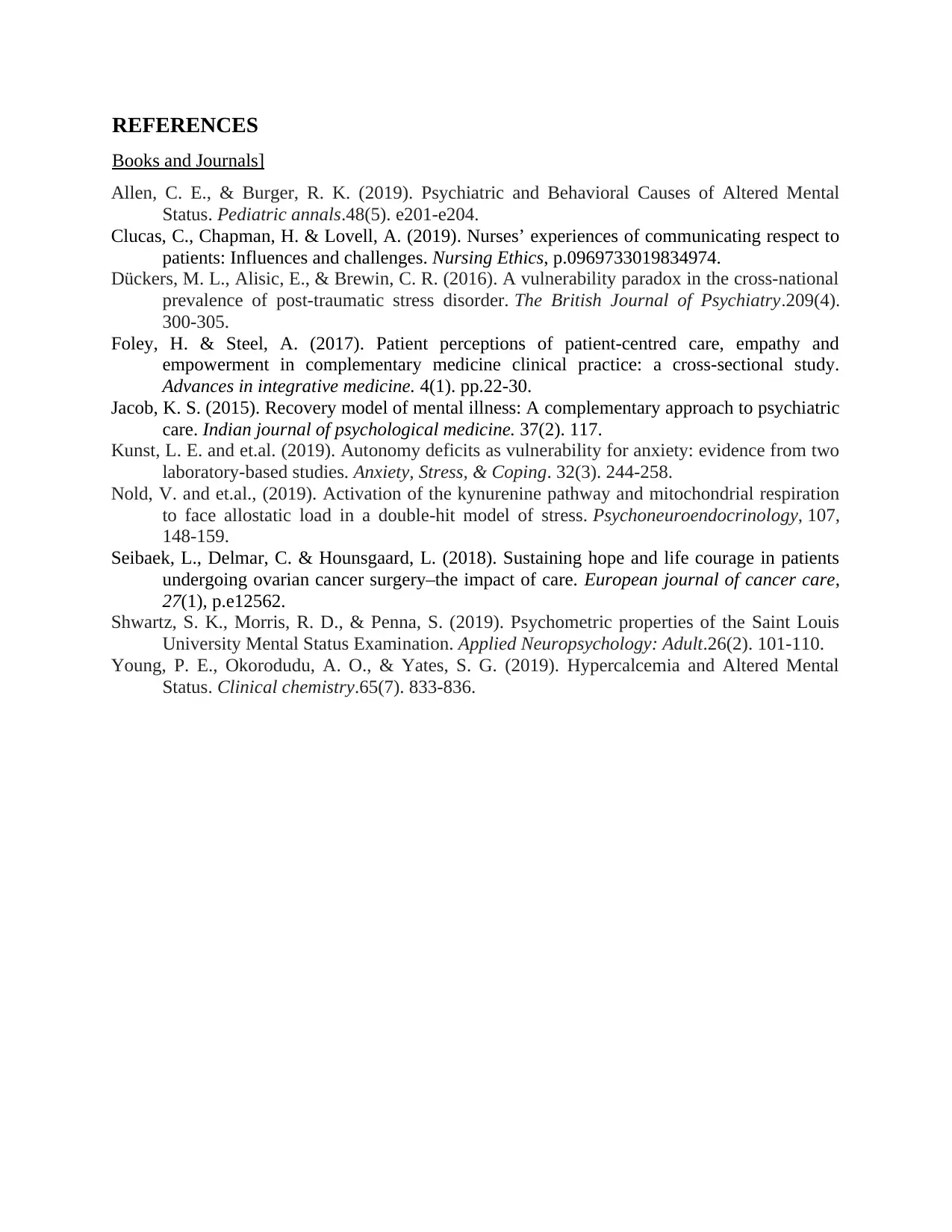
REFERENCES
Books and Journals]
Allen, C. E., & Burger, R. K. (2019). Psychiatric and Behavioral Causes of Altered Mental
Status. Pediatric annals.48(5). e201-e204.
Clucas, C., Chapman, H. & Lovell, A. (2019). Nurses’ experiences of communicating respect to
patients: Influences and challenges. Nursing Ethics, p.0969733019834974.
Dückers, M. L., Alisic, E., & Brewin, C. R. (2016). A vulnerability paradox in the cross-national
prevalence of post-traumatic stress disorder. The British Journal of Psychiatry.209(4).
300-305.
Foley, H. & Steel, A. (2017). Patient perceptions of patient-centred care, empathy and
empowerment in complementary medicine clinical practice: a cross-sectional study.
Advances in integrative medicine. 4(1). pp.22-30.
Jacob, K. S. (2015). Recovery model of mental illness: A complementary approach to psychiatric
care. Indian journal of psychological medicine. 37(2). 117.
Kunst, L. E. and et.al. (2019). Autonomy deficits as vulnerability for anxiety: evidence from two
laboratory-based studies. Anxiety, Stress, & Coping. 32(3). 244-258.
Nold, V. and et.al., (2019). Activation of the kynurenine pathway and mitochondrial respiration
to face allostatic load in a double-hit model of stress. Psychoneuroendocrinology, 107,
148-159.
Seibaek, L., Delmar, C. & Hounsgaard, L. (2018). Sustaining hope and life courage in patients
undergoing ovarian cancer surgery–the impact of care. European journal of cancer care,
27(1), p.e12562.
Shwartz, S. K., Morris, R. D., & Penna, S. (2019). Psychometric properties of the Saint Louis
University Mental Status Examination. Applied Neuropsychology: Adult.26(2). 101-110.
Young, P. E., Okorodudu, A. O., & Yates, S. G. (2019). Hypercalcemia and Altered Mental
Status. Clinical chemistry.65(7). 833-836.
Books and Journals]
Allen, C. E., & Burger, R. K. (2019). Psychiatric and Behavioral Causes of Altered Mental
Status. Pediatric annals.48(5). e201-e204.
Clucas, C., Chapman, H. & Lovell, A. (2019). Nurses’ experiences of communicating respect to
patients: Influences and challenges. Nursing Ethics, p.0969733019834974.
Dückers, M. L., Alisic, E., & Brewin, C. R. (2016). A vulnerability paradox in the cross-national
prevalence of post-traumatic stress disorder. The British Journal of Psychiatry.209(4).
300-305.
Foley, H. & Steel, A. (2017). Patient perceptions of patient-centred care, empathy and
empowerment in complementary medicine clinical practice: a cross-sectional study.
Advances in integrative medicine. 4(1). pp.22-30.
Jacob, K. S. (2015). Recovery model of mental illness: A complementary approach to psychiatric
care. Indian journal of psychological medicine. 37(2). 117.
Kunst, L. E. and et.al. (2019). Autonomy deficits as vulnerability for anxiety: evidence from two
laboratory-based studies. Anxiety, Stress, & Coping. 32(3). 244-258.
Nold, V. and et.al., (2019). Activation of the kynurenine pathway and mitochondrial respiration
to face allostatic load in a double-hit model of stress. Psychoneuroendocrinology, 107,
148-159.
Seibaek, L., Delmar, C. & Hounsgaard, L. (2018). Sustaining hope and life courage in patients
undergoing ovarian cancer surgery–the impact of care. European journal of cancer care,
27(1), p.e12562.
Shwartz, S. K., Morris, R. D., & Penna, S. (2019). Psychometric properties of the Saint Louis
University Mental Status Examination. Applied Neuropsychology: Adult.26(2). 101-110.
Young, P. E., Okorodudu, A. O., & Yates, S. G. (2019). Hypercalcemia and Altered Mental
Status. Clinical chemistry.65(7). 833-836.
1 out of 6
Related Documents
Your All-in-One AI-Powered Toolkit for Academic Success.
+13062052269
info@desklib.com
Available 24*7 on WhatsApp / Email
![[object Object]](/_next/static/media/star-bottom.7253800d.svg)
Unlock your academic potential
© 2024 | Zucol Services PVT LTD | All rights reserved.





